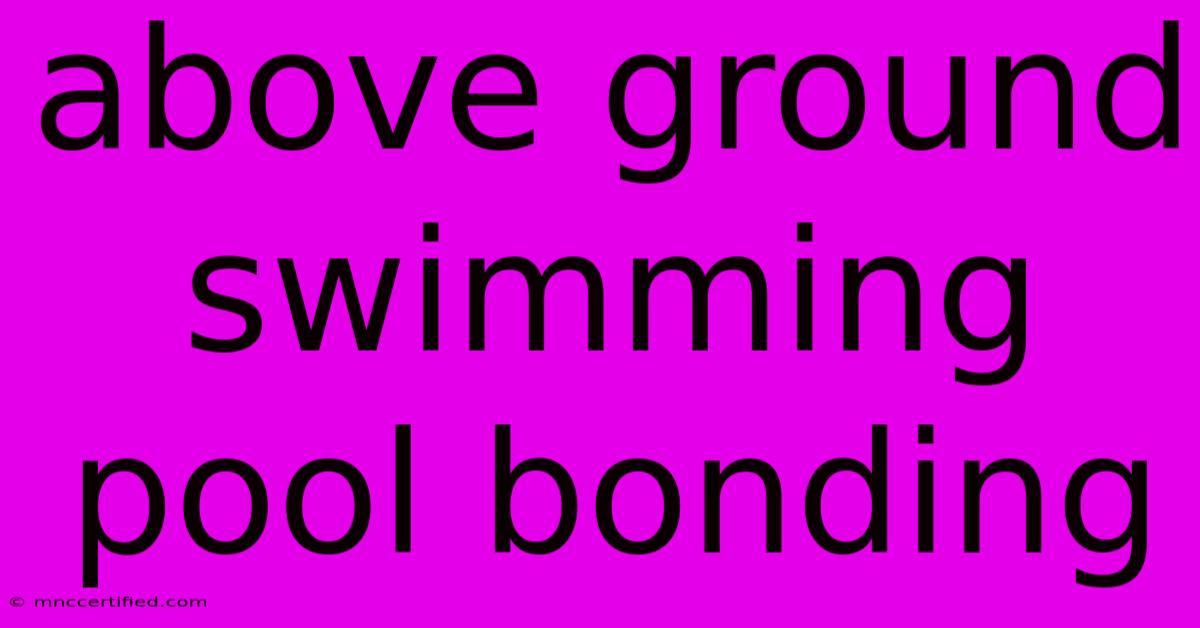Above Ground Swimming Pool Bonding

Table of Contents
Above Ground Pool Bonding: Why It's Crucial for Safety and Longevity
Owning an above ground pool brings endless summer fun. But to ensure your pool is both safe and lasts for years, you need to understand the importance of above ground pool bonding. This essential step protects you and your family from electrical shock hazards while safeguarding your investment.
What is Above Ground Pool Bonding?
Pool bonding connects all metallic parts of your pool to the electrical grounding system of your home. This creates a single, continuous electrical path, ensuring that if a stray electrical current enters the water, it will be safely diverted to the ground instead of flowing through you.
Why is Pool Bonding Important?
Here are the key reasons why bonding your above ground pool is crucial:
- Safety: The most important reason to bond your pool is to prevent electrical shock. If an electrical fault occurs, such as a malfunctioning pump or loose wiring, the current can travel through the water and potentially shock anyone swimming in it.
- Preventing Corrosion: Bonding helps prevent corrosion of the pool's metal components. This is because it equalizes the electrical potential between the metal parts, reducing the likelihood of electrolytic corrosion.
- Compliance: Most building codes require pools to be properly bonded for safety reasons.
What Needs to Be Bonded?
Any metallic part that could come into contact with the water needs to be bonded. This includes:
- Ladders: Both the top and bottom rails of your pool ladder.
- Handrails: Any handrails around the pool deck.
- Lights: All underwater and deck-mounted lights.
- Filters: The metal housing of the filter system.
- Pipes: Any metal pipes used for water flow, including return lines.
- Skimmers: The skimmer basket and housing.
How to Bond Your Above Ground Pool
Bonding your above ground pool isn't a DIY project for the faint of heart. It requires proper knowledge and electrical expertise. Here's a general overview of the process:
- Identify the Bonding Point: This is the point where the bonding wire connects to the grounding system of your home. It's often located on the electrical panel.
- Choose the Right Wire: Use a #6 AWG copper bonding wire, which is specifically designed for electrical grounding.
- Connect the Bonding Wire: Securely attach the bonding wire to the designated bonding point using a grounding clamp.
- Bond All Metal Components: Connect the bonding wire to each metal part of your pool using bonding clamps or straps.
- Verify the Connection: Use a multimeter to test the continuity of the bonding system to ensure it is working correctly.
Professional Assistance: It's highly recommended to hire a licensed electrician for professional pool bonding. They have the expertise to ensure the job is done correctly and meets all safety standards.
Conclusion
Bonding your above ground pool is a vital safety measure and an essential investment in the longevity of your pool. By creating a safe electrical environment, you can enjoy your pool worry-free and protect your family from potential hazards. Remember, pool bonding is not an option but a necessity. Don't take any risks with your pool's safety – contact a qualified electrician today to ensure your pool is properly bonded.

Thank you for visiting our website wich cover about Above Ground Swimming Pool Bonding. We hope the information provided has been useful to you. Feel free to contact us if you have any questions or need further assistance. See you next time and dont miss to bookmark.
Featured Posts
-
8 2 The Nature Of Covalent Bonding
Nov 15, 2024
-
Crypto Reels No Deposit Bonus 2024
Nov 15, 2024
-
Maori Mps Stage Protest In New Zealand Parliament
Nov 15, 2024
-
Mc Guinness C Beebies Bedtime Story A Cop Tale
Nov 15, 2024
-
Highly Speculative Bonds Crossword
Nov 15, 2024